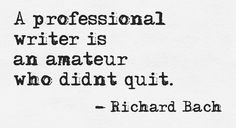I think it’s safe to say that anyone who considers themselves a writer has dealt with two things: Writer’s block, and your ruthless inner critic.
I recently posted about my first experience with Julia Cameron’s book, The Artist’s Way. The first section features a segment about what Cameron calls “The Morning Pages.” Essentially, this is a daily practice of writing three unfiltered, unedited pages of whatever you want. The point is to write without limits; not allowing yourself to look back and criticize what you’ve written. I found myself, of course, over-thinking what I was writing. Isn’t it kind of interesting that your inner critic comes out, even when you’re doing informal journaling that no one will ever lay eyes on except for you?
That’s a problem I’ve been struggling with lately; it’s somewhere between writer’s block and my inner critic. It’s not that I don’t have ideas, but I can’t bring myself to write something that I don’t think is good enough. I’ll begin, writing a couple paragraphs, then look back at what I wrote. Sigh. This sounded so much better in my head. I know all of the how-to books and tips on writing say, “just write!” It’s not as easy as they say. Sure, technically I am writing, but repeated exposure to my inner critic along with lackluster writing doesn’t seem to improve my writing the way all the writing experts say it will.
Julia Cameron stresses the endless possibilities of the morning pages. She encourages the writer to include all of the seemingly petty, silly things floating in their mind. Getting them off your chest, and into the morning pages. It will free you; once they’re out of the way, it’s just you and your creativity. The morning pages give you the power to grant yourself the freedom to make mistakes. In the beginning, I wrote my morning pages as a stream of consciousness, but as a narrative. It could be a major production of dueling dragons, chivalrous knights, and fair maidens. It could be about an alternate theory as to how Peter Parker became Spider-Man. I like to alternate my writing setting, and the local Starbucks is one of the places that I frequent. It sounds somewhat creepy, but sometimes I would pick a person in the coffee shop and make up a story about them.
I thought that writing the morning pages as a narrative could spark an idea for a real story. I really enjoyed it, and this practice did generate some worthwhile ideas that I explored further outside of the morning pages. Occasionally I would have a bad day, and wouldn’t feel like being creative. I would just write my morning pages about what ruined my day. It became progressively less artistic, and infinitely more of an angst-filled diary. In my defense, I was around 15 years old the first time I began morning pages. Oh, the pleasantries of pages upon pages, filled with documentation of teenage melodrama. I’m sure you can understand why the morning pages, at that point, were no longer beneficial to my creative process.
I have progressed in Julia Cameron‘s book, and am now in the stage of “creative recovery.” She essentially encourages readers to nurture their creative self; protect it from criticism. Evaluate and dissect the appraisal; expose yourself to the constructive criticism. Assess what it is about the purely negative critique that bothers you; if you can create constructive criticism from that, then do so. If not, discard it. If it can’t help you, it serves no purpose.
I wouldn’t say I’m a pessimist, but I’m certainly not an optimist. Perhaps it’s me disguising negativity as being a realist. Whatever you want to call it, I know that I will always be somewhat critical of myself when it comes to writing. I used to be able to just retrieve that spark of passion, and write eagerly. My ideas were exciting to me, and I believed in them with every fiber of my being. I had created characters that became more than characters to me. I developed them, and they were important enough to me that they served as gasoline on flames; I wanted to write more. I loved the story, I loved the characters, and it was my duty to narrate their adventures in a way that was worthy of them. Lately, while I have been writing, it feels forced. I have no passion for what I am writing. My inner perfectionist is constantly reminding myself that what I’m doing isn’t worth being passionate about.
My question to all of you is this: How do you overcome your inner critic? What is it that ignites passion for what you’re writing?
This post is for all my writers!
I love when I see collaboration, sharing of ideas, offering advice and constructive criticism, and most importantly praise for a great post amongst writers. Everyone has their own unique style, and writers can learn a lot from each other. Anything that you have to share; a useful tip someone once shared with you, pass it on. A source that provides you with infinite inspiration, share it in a comment below! Also, if you have a favorite author, who is it and why? Let me know! Thank you all for reading!

I’m a fellow perfectionist. I don’t do much creative writing, but have to write papers as part of my job — I’m told I excel in it, but it’s incredibly painful to write anything. I usually don’t write more than one or two pages per the entire day… So, I have no tips, but if it’s any comfort, I know how you feel!
It’s always nice knowing that you’re not the only one! Thank you for reading! 🙂
[…] writing my morning pages as Julia Cameron instructs, I have discovered how helpful unfiltered writing can be. Essentially as […]